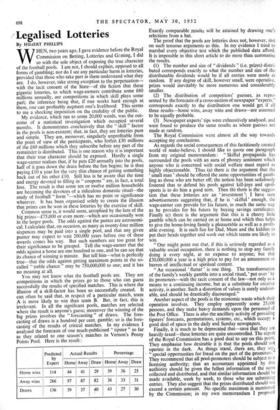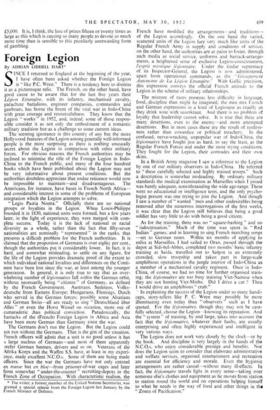/Legalised Lotteries
By HUdERT PHILLIPS WHEN, two years ago, I gave evidence before the Royal Commission on Betting, Lotteries and Gutting, I did so with the sole object of exposing the true character of the football pools. I am not, I should explain, opposed to all forms of gambling; nor do I see any particular harm in lotteries, provided that those who take part in them understand what they area I do, however, take strong exception to the perpetuation— with the tacit consent of the State—of the fiction that these gigantic lotteries, to which wage-earners contribute some £60 millions annually, are competitions in which skill plays some part; the inference being that, if one works hard enough at them, one can profitably augment one's livelihood. This seems to me a shocking imposition on the credulity of the public. My evidence, which ran to some 20,000 words, was the out- come of a statistical investigation which occupied several months. _ It demonstrates conclusively that the " skill " factor in the pools is non-existent; that, in fact, they are lotteries pure and simple. They are, moreover, singularly unprofitable from the point of view of the participants, who forfeit £30 millions of the £60 millions which they subscribe before any part of the remainder is distributed. This is one reason why it is important that their true character should be exposed. Hardly a single wage-earner realises that, if he puts £20 annually into the pools, half of it goes down the drain before the fun begins; he is thus paying £10 a year for the very thin chance of getting something back out of his other £10. Still less is he aware that the time and energy devoted to filling in " coupons " are, in fact, a total loss. The result is that some ten or twelve million households are becoming the devotees of a ridiculous domestic ritual—the study of football " form "—which has no point or significance whatever. It has been organised solely to create the illusion that prizes can be won in these lotteries by the exercise of skill. Common sense is, it would seem, atrophied by the lure of the big prizes—£75,000 or even more—which are occasionally won in the larger pools. The odds against the punter are astronomi- cal. I calculate that, on occasion, as many as twenty-four million sixpences may be paid into a single pool, and that any given punter may expect to wait 200,000 years before one of these awards comes his way. But such numbers are too great for their significance to be grasped. Tell the wage-earner that the odds against a horse are one hundred to one, and he can see that its chance of winning is minute. But tell him—what is perfectly true—that the odds against getting maximum points in the so- called " treble chance " may be 750,000,000 to one; and it has no meaning at all. You may not know what the football pools are. They are competitions in which the prizes go to those who can guess successfully the results of specified matches. This is where the illusion of a skill-factor has been so successfully created. It can often be said that, in respect of a particular match, team A is more likely to win than team B. But, in fact, this is irrelevant. In all the significant pools, matches are selected• where the result is anyone's guess; moreover the winning of the big prizes involves the " forecasting " of draws. The fore- casting of draws is a hundred per cent. gamble; so is the fore- casting of the results of critical matches. In my evidence I analysed the forecasts of one much-publicised " tipster " so far as they related to one season's, matches in Vernon's Penny Points Pool. Here is the result : Predicted by Expert Actual Results Percentage Home Away Draw Home Away Draw Home wins 114 44 41 29 39 36 25 Away wins 266 97 87 82 36 33 31 Draws 136 59 37 40 43 27 30 Exactly comparable results will be attained by drawing one's selections from a hat.
The proof that the pools are lotteries does not, however, fest on such tenuous arguments as this. In my evidence I tried to marshal every objective test which the published data afford. It is impossble in this short article to do more than summarise the results.
(1) The number and size of " dividends " (i.e. prizes) distri- buted corresponds exactly to what the number and size of the distributable dividends would be if all entries were made at random. If any degree of skill, however small, were operative, prizes would inevitably be more numerous and considerably smaller.
(2) The distribution of competitors' guesses, as repre- sented by the forecasts of a cross-section of newspaper "experts," corresponds exactly to the distribution one would get if all three results—home wins, away wins and draws—are assumed to be equally probable.
(3) Newspaper experts' tips were exhaustively analysed, and were found to produce the same results as where guesses are made at random. • The Royal Commission went almost all the way towards accepting my conclusions.
As regards the social consequences of this factitiously created world of make-believe, I should like to quote one paragraph from my original memorandum : " Skilful propaganda has surrounded the pools with an aura of phoney sentiment which anyone who is concerned with social welfare must regard as highly objectionable. Thus (a) there is the argument that the ' small man ' should be offered the same opportunities of gamb- ling as those who are better off; the notion has been sedulously fostered that to defend his pools against kill-joys and spoil- sports is to do him a good turn. Then (b) there is the sugges- tion that these lotteries are an ' investment '; I have seen advertisements suggesting that, if he is ' skilful' enough, the wage-earner can provide for his future, in much the same way as he provides for his future by buying savings certificates. Finally (c) there is the argument that this is a cheery little gamble which can be carried on at home and which thus helps to give the home-loving family a pleasurable as well as a profit- able evening. It is such fun for Dad, Mum and the kiddies to put their heads together and work out which teams are likely to win.
" One might point out that, if this is seriously regarded as a valuable social occupation, there is nothing to stop any family doing it every night, at no expense to anyone; but that £30,000,000 a year is a high price to pay for an amusement so barren of intellectual or spiritual content. "An occasional ' flutter ' is one thing. The transformation of the family's weekly gamble into a social ritual, ' put over ' by its promoters—with the tacit consent of the law—not only as a means to a continuing income, but as a substitute for creative activity, is another. Such a distortion of values is surely undesir- able, and should be drastically discouraged."
Another aspect of the pools is the economic waste which their operation involves. They employ apparently some 23,000 persons, and they make heavy demands upon the personnel of the Post Office. There is also the ancillary activity of providing tipsters' forecasts, permutations, systems, etc., which occupy a good deal of space in the daily and Sunday newspapers. Finally, it is much to be deprecated that—save that they are heavily taxed—these lotteries are quite uncontrolled. The report of the Royal Commission_has a good deal to say on-this point. They emphasise how desirable it is that the pools should not operate in the dark. As things -stand, There are, they say, " special opportunities for fraud on the part of the promoters." They recommend that all pool-promoters should be subject to a licensing Authority; that an accountant appointed by this auth&ity should be given the fullest information of the sums collected and distributed, and that similar information should be made available, week by week, to those who are submitting entries. They also suggest that the prizes distributed should not exceed a certain amount. No specific maximum is mentioned by the Commission; in my own memorandum I proposed £5,000. It is, I think, the lure of prizes fifteen or twenty times as large as this which is causing so many people.to devote so much more time than is sensible to this peculiarly unrewarding form of gambling.











































 Previous page
Previous page